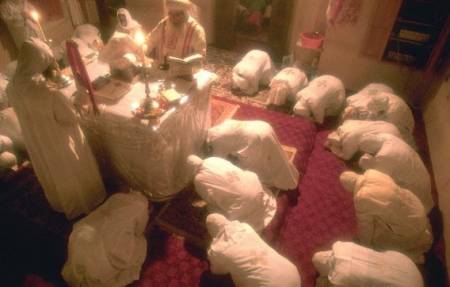Okay. Why is this question being treated as if it is categorically off limits, then? What if God wants you to testify to this and you are not doing so out of a misguided attempt to preserve the sacredness of the visitations of His angels? Do you know that this is not the case, such that answers focusing on how this is 'incredibly disrespectful' aren't perhaps making too broad a statement?
I could understand the Mormon replies here a bit better if people were saying "I don't personally feel comfortable talking about this stuff, but here's a resource you can read where other people do talk about it" (since that would satisfy the OP without exposing anyone's personal stories that they didn't already put out there), but the way that the OP is being non-answered makes it seem like it's an offense to even
ask. That's what's so weird to me.
I would welcome people showing interest in my faith, and if it is done by talking about miracles, then so what? It gets them talking and thinking about it. After all, isn't that why miracles happen in the first place -- to confirm the presence of God among His people so that they may believe and bear witness to Him? A miracle (be it a visitation, healing, or whatever) that cannot be talked about because it's
too sacred to be discussed by mere people is kind of a lousy miracle.
In traditional churches, the Eucharist is the zenith of the liturgy, during which time is manifested among us the true Christ Whose body and blood we consume in the Eucharistic sacrifice, for the salvation of our souls. Being that this is what is taking place, we literally prostrate ourselves before the Holy blood and body during the section of the liturgy when they are presented and respond to the priest's proclamations by saying "We worship Your holy body, and Your precious blood".
There literally cannot be anything more sacred than direct communion with our Lord, God, and Savior Jesus Christ. And
because it is so sacred, we talk about it! We want people to understand what is going on and why and what it all means.
Why is the Mormon reaction so different than this? Even those Christians who do not believe in the true presence of Christ in the Eucharist and instead regard it as a memorial still talk about it openly with those who want to learn whatever it is their particular church teaches about it. I grew up in the Presbyterian Church, which at least in our church favored grape juice and crackers (Lord have mercy!), and yet I can remember our pastor still talking about the last supper, and treating it with all the gravitas he could muster in the context of that church's theology.
The point is that it is still talked about. I have not seen anyone retreat into this 'too sacred to discuss' idea in any Christian church I've been in, whether Protestant, Catholic, or now Orthodox. The closest thing I've ever heard is that some things are too sacred, too far above our ability to comprehend them to be encapsulated in language, but that's a different stance than saying 'talking about them is inherently offensive', which is how some of these replies are coming off.
I mean, Christianity itself maintains as a matter of basic doctrine and faith that Jesus Christ is the Son of God, who came down from heaven to save and redeem mankind and the entire creation. So we have a religion which says "God literally came here and walked, talked, healed, preached, died, and resurrected among us." What could be more sacred than being in the literal presence of God? And yet that's what we say happened, and still happens! And we're so committed to it that we wrote a whole book about it (the New Testament), and many, many, many other things (all the writings of the fathers, the canons and creeds of the councils, the hymns, the martyrologies, etc.),
all to communicate it to people.
And it's the most sacred thing that has ever happened.
I am filled with praise beyond all words for our masters and fathers the apostles and their disciples, because they did not think this a thing to be held onto among themselves so that the likes of us wouldn't ruin it somehow, but instead brought it to us so that we may be transformed by it as they themselves were!


